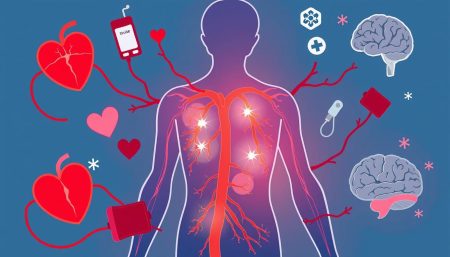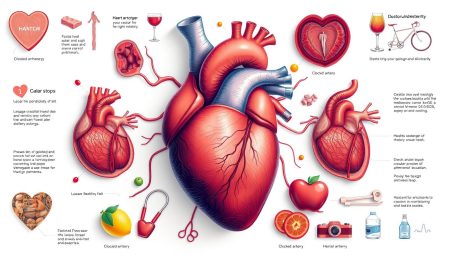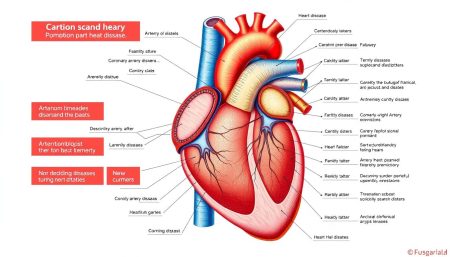Heart health is a big deal for many Americans. Knowing how to test for cardiovascular disease can save lives. This guide looks at different tests and ways to diagnose heart disease.
We’ll talk about everything from simple blood pressure checks to advanced imaging. Knowing about these tests helps you take care of your heart. Early detection through screening can greatly improve heart condition management and treatment.
We’ll cover the basics of cardiovascular testing. This will help you understand what each test is about. Whether you’re at risk or just want to stay healthy, this info is key. Let’s explore heart disease diagnosis and how these tests keep your heart safe.
Understanding Cardiovascular Disease and Its Impact
Cardiovascular disease affects millions worldwide, making early detection of heart conditions key. This silent killer comes in many forms, each with its own challenges for patients and healthcare systems.
Common Types of Heart Disease
Heart disease has many forms, affecting different parts of the heart and blood vessels. Coronary artery disease, heart valve problems, and arrhythmias are common. Knowing the risk factors helps in preventing and treating heart disease early.
Global Statistics and Prevalence
Cardiovascular diseases are the leading cause of death worldwide. In the United States, someone dies from heart disease every 34 seconds. This shows how critical early detection and prevention are.
| Region | CVD Deaths (Annual) | Prevalence Rate |
|---|---|---|
| North America | 655,000 | 28% |
| Europe | 3.9 million | 45% |
| Asia | 9.1 million | 38% |
Economic and Social Impact of Cardiovascular Conditions
The cost of heart disease is huge. It includes medical bills, lost work time, and expenses for caregivers. Families also face emotional stress and changes in lifestyle. Early detection can greatly lessen these effects, showing the importance of proactive health steps.
“Prevention is better than cure. Identifying risk factors for heart disease early can save lives and reduce healthcare costs.”
How to Test for Cardiovascular Disease
Finding heart problems early is key to good treatment. Today, we have many ways to check heart health. These range from simple physical checks to advanced imaging, giving us a clear view of how the heart works.
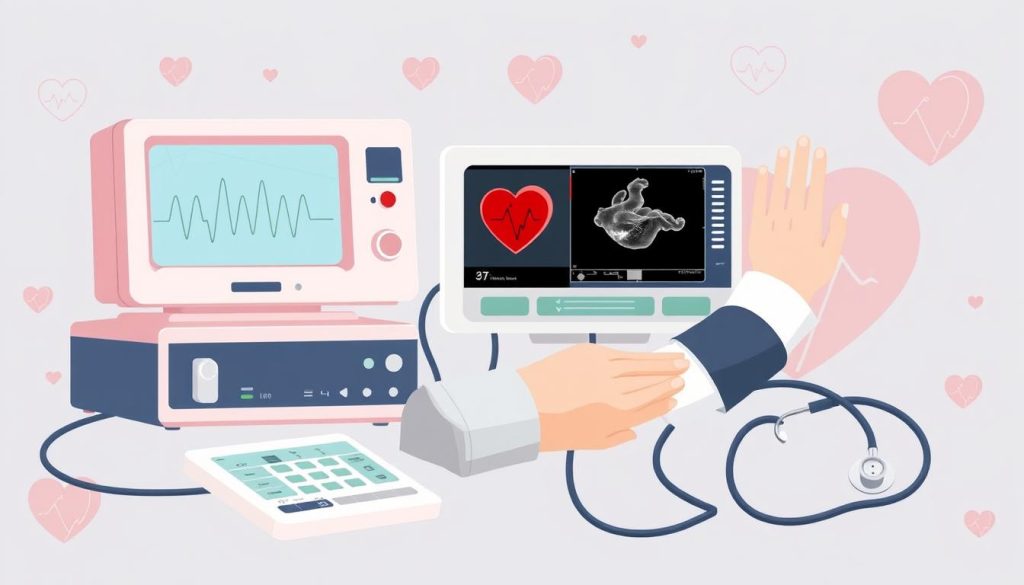
It all starts with a detailed physical exam. Your doctor will check your blood pressure, listen to your heart, and look at your overall health. This first step can show signs that need more checking.
Blood tests are also important. They check your cholesterol, blood sugar, and proteins that show heart stress. High levels might mean you need more tests to see how your heart is doing.
Non-invasive tests are a big part of finding heart disease. These include:
- Electrocardiograms (ECG) to record heart electrical activity
- Echocardiograms using sound waves to create heart images
- Stress tests to evaluate heart function during exercise
For even more details, doctors might suggest advanced imaging. These tests give clear pictures of the heart’s structure and how it works. They help doctors make better treatment plans.
Sometimes, doctors need to use invasive tests like cardiac catheterization. These give the most detailed info about heart health. But they’re usually used only when needed.
“Early detection through appropriate testing can significantly improve outcomes for those at risk of heart disease.”
Knowing about your testing options helps you take care of your heart. Talk to your doctor about the right tests for you. This depends on your risk factors and any symptoms you have.
Essential Physical Examinations and Initial Screenings
Preventive cardiology testing begins with basic but important exams. These tests help find heart problems early.

Blood Pressure Monitoring
Checking blood pressure is key in preventive cardiology. High blood pressure can be silent but serious. A simple test with a cuff measures your blood pressure, showing your heart’s health.
Heart Rate and Rhythm Assessment
Feeling your pulse is a quick way to check your heart. Doctors listen with a stethoscope for any odd beats. This test can spot heart rhythm issues that need more looking into.
Body Mass Index (BMI) Calculations
BMI is a big part of heart health checks. It shows if your weight is healthy for your height. While not perfect, it can warn of heart disease risk. Doctors use it with other tests to check your heart health.
These first tests give a quick look at your heart’s state. They’re easy, fast, and can spot problems early. Early detection is vital for a healthy heart.
Blood Tests and Laboratory Diagnostics
Blood tests are key in checking for heart disease risk. They give insights into your heart health. Doctors use them to see if you might face heart problems.
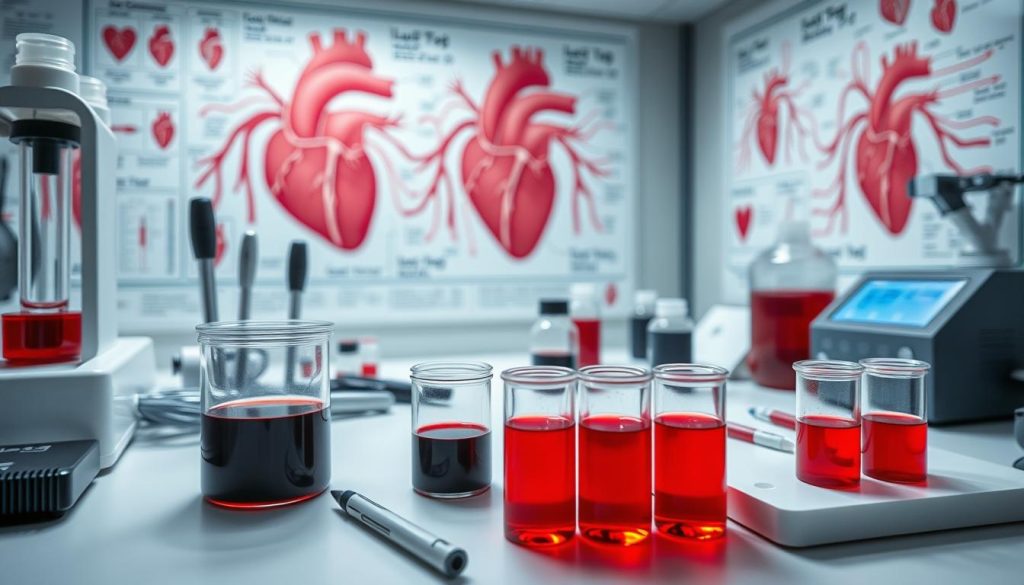
Cholesterol Level Testing
Cholesterol tests are important in heart screenings. They check for different fats in your blood. High LDL (bad) cholesterol raises heart disease risk. But, high HDL (good) cholesterol helps protect your heart.
Blood Sugar Analysis
Blood sugar tests spot diabetes or prediabetes, both heart disease risks. They look at your fasting blood glucose or A1C levels. The A1C shows your blood sugar over three months.
Cardiac Biomarkers
Cardiac biomarkers are released when the heart is hurt. Tests for these, like troponin and BNP, can find heart attacks and failure. They’re key in spotting heart disease risks and checking heart health.
| Test | Purpose | Risk Indication |
|---|---|---|
| Cholesterol | Measure blood fats | High LDL, Low HDL |
| Blood Sugar | Check for diabetes | Elevated glucose levels |
| Cardiac Biomarkers | Detect heart damage | Elevated troponin or BNP |
These blood tests are essential in heart screenings. They help doctors find heart issues early. Then, they can plan the right treatment.
Non-Invasive Diagnostic Procedures
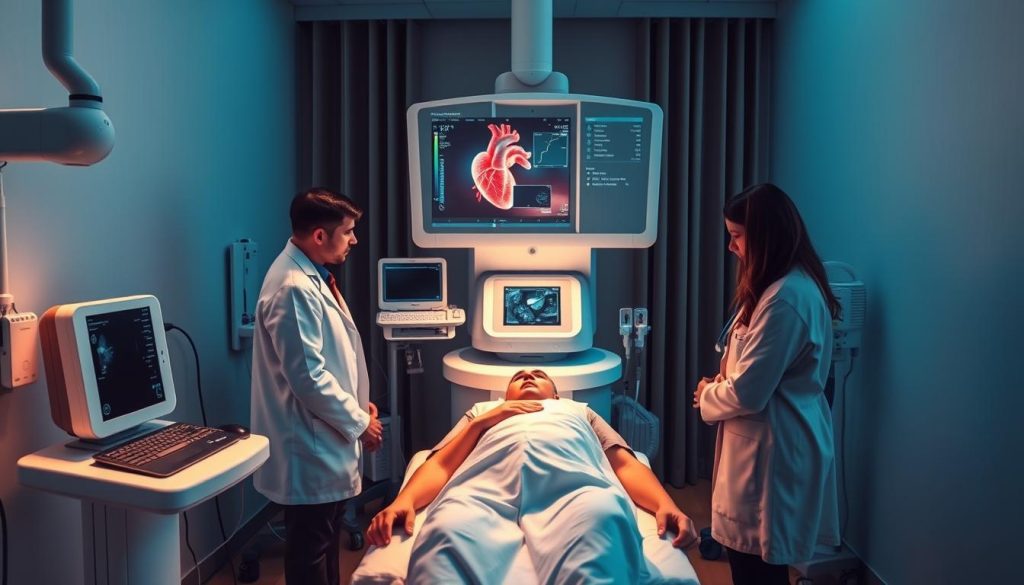
Non-invasive tests are a safe and comfy way to check your heart health. They let doctors get important info without needing to cut you or go inside your body.
These tests are key in spotting heart issues early. They’re often the first step in checking your heart’s health. They can find problems with heart rhythm, blood flow, and how well your heart works.
“Non-invasive tests are like a window into your heart’s health, providing valuable insights without any discomfort,” explains Dr. Sarah Johnson, a leading cardiologist.
Some common non-invasive tests include:
- Electrocardiogram (ECG)
- Echocardiogram
- Stress tests
- Holter monitoring
These tests don’t hurt and are quick. They’re usually covered by insurance and can be done outside the hospital. For many, these tests give them peace of mind and help decide on treatment.
Knowing about these tests can help you take care of your heart. Always talk to your doctor about which tests are best for you. This depends on your risk factors and symptoms.
Advanced Imaging Technologies for Heart Disease
Modern cardiac diagnostic procedures have changed how doctors check heart health. These new imaging technologies give detailed views of the heart’s structure and function. They improve how we evaluate heart health.
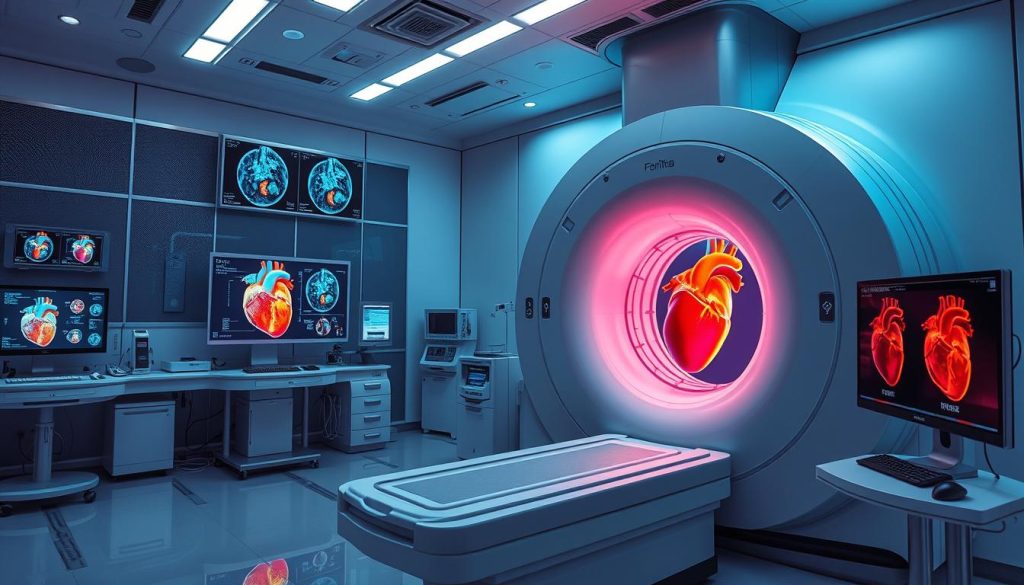
Cardiac CT Scans
Cardiac CT scans use X-rays to make detailed images of the heart. This test is non-invasive and can spot blockages in coronary arteries. It also checks heart valve function. It’s great for those with chest pain or suspected heart disease.
Magnetic Resonance Imaging (MRI)
Cardiac MRI makes detailed images of the heart without using radiation. It’s perfect for seeing heart muscle damage, congenital heart defects, and blood flow. MRI is a key tool for diagnosing complex heart conditions.
Nuclear Medicine Studies
These tests use small amounts of radioactive tracers to check heart function. They show areas with reduced blood flow. This helps doctors find coronary artery disease or damage from a heart attack.
| Imaging Technology | Primary Use | Radiation Exposure |
|---|---|---|
| Cardiac CT | Coronary artery assessment | Low |
| Cardiac MRI | Heart muscle evaluation | None |
| Nuclear Studies | Blood flow analysis | Low |
These advanced imaging technologies are key in modern heart disease evaluation. They give doctors valuable insights. This leads to more accurate diagnoses and tailored treatment plans for heart disease patients.
Stress Testing Methods and Protocols
Stress testing is key in checking for heart disease. These tests show how your heart works when you’re active. Let’s look at the main stress tests used.
Treadmill Exercise Tests
In a treadmill test, you walk or run on a treadmill while an ECG machine tracks your heart. The pace and incline get harder. This test checks how your heart handles exercise.
It’s a common way to find heart problems and see how fit you are.
Chemical Stress Tests
For those who can’t exercise, chemical stress tests are used. A drug is injected to make your heart act like it’s exercising. This test finds blockages in heart arteries.
It’s often paired with imaging tests for a detailed heart function view.
Stress Echocardiograms
A stress echo combines exercise with ultrasound imaging. You exercise on a treadmill or stationary bike. Then, doctors take ultrasound pictures of your heart before and after.
This test spots poor blood flow or heart muscle damage.
These tests are vital for diagnosing heart issues. They help doctors plan the right treatment. Regular tests catch problems early, keeping your heart healthy.
Knowing about these tests helps you take care of your heart. If you’re worried about your brain health, remember heart and brain health are linked.
For more on brain health, check out this article.
Invasive Diagnostic Procedures
When non-invasive tests don’t give enough information, doctors might use invasive tests. These tests give a closer look at the heart’s function and structure. They are key in diagnosing heart disease.
Cardiac catheterization is a common invasive procedure. A thin tube is inserted into a blood vessel, usually in the groin or arm. It’s then guided to the heart. Doctors can measure blood pressure in the heart chambers and check for blockages in coronary arteries.
Angiography often goes with catheterization. A special dye is injected into the bloodstream. X-ray images show how blood flows through the heart and its vessels. This helps find narrowed or blocked areas.
- Electrophysiology studies use catheters to map the heart’s electrical system
- Myocardial biopsies involve taking small tissue samples from the heart muscle
- Intravascular ultrasound provides detailed images of artery walls
These procedures have some risks but are very informative. They help doctors make important treatment decisions. This information can be life-saving for patients with serious heart conditions.
Understanding Your Test Results
Getting your cardiovascular test results can be overwhelming. It’s important to know what they mean for your heart health. Let’s look at how to understand these findings and what steps to take next.
Normal vs. Abnormal Findings
Test results are either normal or abnormal. Normal results mean your heart is working well. Abnormal findings might show possible problems. Your doctor will tell you which values are off and why they matter.
Risk Factor Assessment
Knowing your risk factors for heart disease is key. These include high blood pressure, high cholesterol, and diabetes. Your test results show your heart health and help prevent future problems.
| Risk Factor | Normal Range | High Risk |
|---|---|---|
| Blood Pressure | Below 120/80 mmHg | 140/90 mmHg or higher |
| Total Cholesterol | Below 200 mg/dL | 240 mg/dL or higher |
| Fasting Blood Sugar | Below 100 mg/dL | 126 mg/dL or higher |
Treatment Planning Based on Results
Your test results guide your treatment plan. This could include lifestyle changes, medication, or more tests. Early detection of heart conditions means you can act quickly. Remember, regular screenings are key to keeping your heart healthy and catching problems early.
“Understanding your test results empowers you to take control of your heart health. Don’t hesitate to ask questions and seek clarification from your healthcare provider.”
Prevention and Early Detection Strategies
Keeping your heart healthy is key in fighting heart disease. Tests for cardiology help find risks early. Knowing heart problem signs helps get help fast and avoid danger.
Regular doctor visits are important for catching problems early. These visits check blood pressure, cholesterol, and talk about lifestyle. Eating right, exercising, and not smoking can lower heart disease risk.
- Monitor blood pressure and cholesterol levels
- Maintain a healthy weight
- Engage in regular physical activity
- Limit alcohol consumption
- Manage stress effectively
It’s also key to know heart problem signs. Look out for chest pain, shortness of breath, irregular heartbeat, and fatigue. If you see these, get medical help right away.
“Prevention is better than cure. Regular preventive cardiology testing can detect heart issues before they become critical, potentially saving lives and reducing healthcare costs.”
Combining prevention with early detection helps control heart health. A proactive heart health plan today means a healthier future.
The Future of Cardiovascular Testing
The world of heart health testing is changing fast. New tech is making it easier and safer to find heart problems early. This could save lives and make patients healthier.
Artificial intelligence is changing how we find heart diseases. It can look at medical images and patient data quickly and accurately. This means doctors can diagnose faster and treat each patient better. Wearable devices are also exciting, as they let people check their heart health at home.
Genetic testing is also getting better at finding heart issues early. It can spot genetic markers that show a person’s risk before they show symptoms. This could change how we prevent heart problems. With these new tools, the future of heart health testing looks bright for everyone involved.
FAQ
Q: What are the most common tests for cardiovascular disease?
A: Common tests for heart disease include blood pressure checks and cholesterol tests. You might also have an electrocardiogram (ECG), stress tests, or imaging studies like echocardiograms and cardiac CT scans. These help check your heart’s health and spot risks or conditions.
Q: How often should I get screened for heart disease?
A: How often you need heart disease screenings depends on your age, health, and risk factors. Adults should get their blood pressure checked yearly and cholesterol tested every 4-6 years. Talk to your doctor to figure out the best schedule for you.
Q: What are the risk factors for cardiovascular disease?
A: Heart disease risks include high blood pressure, high cholesterol, and smoking. Obesity, lack of exercise, diabetes, age, family history, and a bad diet also increase your risk. Managing these factors is key to avoiding heart problems.
Q: Can cardiovascular disease be prevented?
A: While some risks like age and family history can’t be changed, many heart disease aspects are preventable. A healthy lifestyle, regular exercise, a balanced diet, not smoking, and managing stress can lower your risk. Controlling conditions like high blood pressure and diabetes also helps.
Q: What are the signs and symptoms of heart problems?
A: Heart problem signs include chest pain, shortness of breath, and irregular heartbeat. Fatigue, swelling in the legs, and dizziness are also symptoms. Some people, like women, might have different symptoms. If you notice anything unusual, see your doctor right away.
Q: Are there any non-invasive tests for heart disease?
A: Yes, there are many non-invasive tests for heart disease. These include ECGs, echocardiograms, stress tests, cardiac CT scans, and MRI scans. They provide important information about your heart without invasive procedures.
Q: What is a stress test and why is it performed?
A: A stress test checks how your heart works during exercise. It’s used to find coronary artery disease, check treatment success, or find safe exercise levels. You’ll walk on a treadmill or bike while your heart is monitored.
Q: How accurate are cardiovascular screening tests?
A: Test accuracy varies by test and individual factors. No test is 100% accurate. Doctors use a mix of tests and your health profile for accurate diagnoses. Discussing test reliability with your doctor is important.
Q: What advancements are being made in cardiovascular testing?
A: New advancements include better imaging, genetic testing, and AI-assisted diagnostics. Researchers are also working on wearable devices and personalized medicine. These aim to improve heart care based on your genetic profile.
Q: How do I prepare for a cardiovascular test?
A: Preparation varies by test. You might need to fast before blood tests or avoid caffeine before stress tests. Wear comfy clothes for physical exams. Always follow your doctor’s instructions and share any medications or health conditions.














